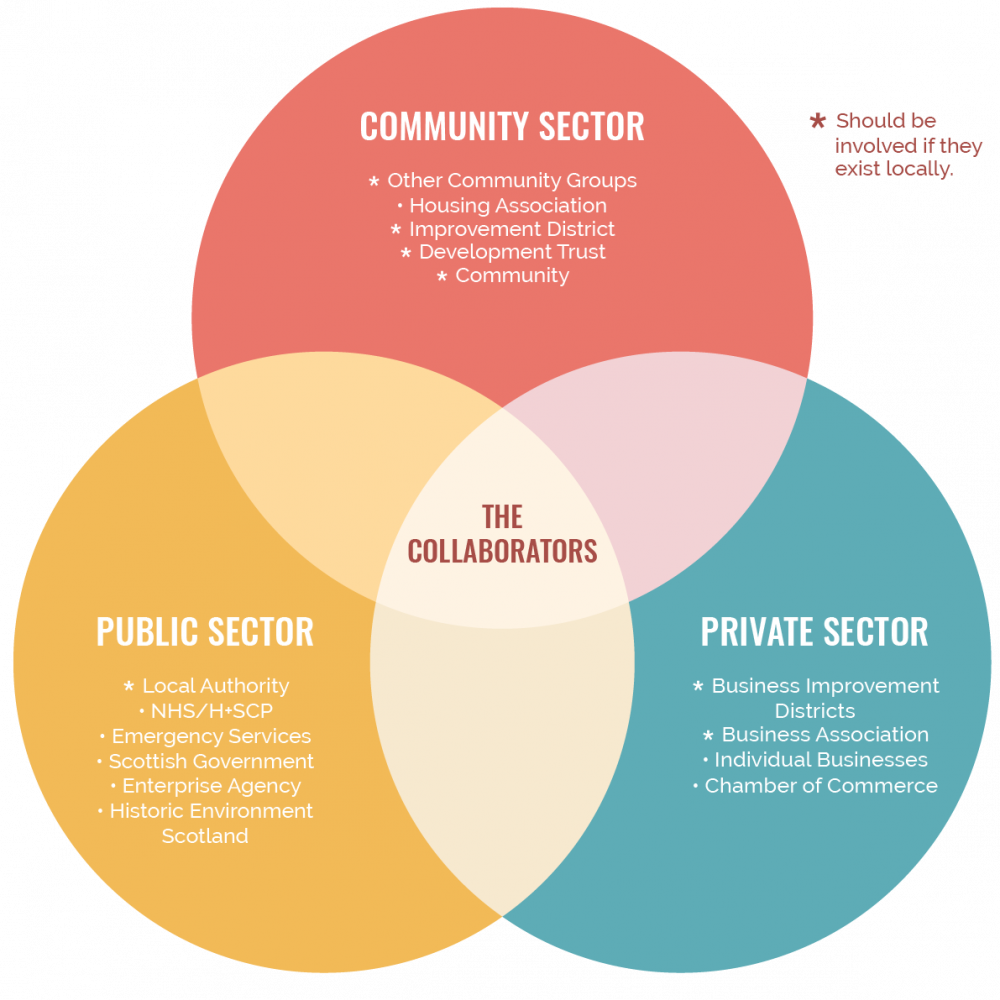Collaboration
Lots of organisations and people make town centres work: residents, businesses, community groups, social enterprises, artists, visitors, the local authority and other public bodies.
Collaboration is critical because:
- No single organisation or person has the power or ability to regenerate a town centre on their own. Everyone has to work together to plan and deliver projects. Residents can help shape the vision for the town centre as a whole, whilst a handful of organisations might work together to plan and deliver individual projects.
- Funders and decision-makers like to see evidence of collaborative working when deciding where to allocate resources. If you can’t demonstrate that the local community, relevant community organisations and the local authority are working together, you’ll find it more difficult to secure funding.
Who needs to be involved?
Everyone who has a role in creating a better town centre needs to be involved, in the spirit of the Scottish Government's Place Principle. They might contribute time and expertise, bring money, grant consents, broker contacts, offer publicity or bring popular support.
The diagram below shows you who the potential collaborators are. Remember, you’ll need at least one organisation from each sector if your ‘team’ is to be credible and effective.

Community sector
Community involvement is essential to make sure that the town centre is giving people what they want, to tap into the energy and enthusiasm that local community organisations can bring, and to help secure support and resources from the government. Local organisations like community councils and community development trusts are invaluable ways of reaching the local community.
- Case Study: Community Councils
- Case Study: Development Trusts
- Case Study: Improvement Districts (BIDs)
- Case Study: Housing Associations
- Case Study: Other community organisations
Public sector
Many public sector bodies have an interest in your town centre. That includes any organisation which has premises or delivers services in a town centre: the Scottish Government, local authorities, UK Department for Work and Pensions, NHS, Health & Social Care Partnership, schools, colleges and universities, emergency services, enterprise agencies and others.
Public bodies can also often offer grant funding or advice to help town centres, such as Historic Environment Scotland in relation to heritage and VisitScotland for tourism.
All public bodies can support town centres by making decisions which put the Town Centre First Principle into practice: putting the health of town centres at the heart of decision making by thinking how and where they spend and invest money on facilities, services and procurement.
Local authorities are particularly important for towns, because they manage so many things that impact on town life. Click on the link below to find out more.
- Case Study: Local authorities
Some local authorities, such as Aberdeenshire Council, have decided to put extra focus on the Town Centre First Principle by integrating it into decision-making across all their services. Find out more in the video below.
Private sector
Individual businesses are the lifeblood of any town centre: shops, cafes, leisure venues, markets and other enterprises generate investment, activity and footfall. When they come together with one voice, they can achieve even more.
- Case Study: Improvement Districts (BIDs)
- Case Study: Business associations
Organisational structures
Coordinating and managing all these different activities and people can be complicated, so it’s important to get the right governance and legal structure in place. Although there is no substitute for taking legal and financial advice at an early stage, the two PDF downloads below describe the different types of legal structures that are available for collaborative working.

Descriptions of different types of legal structures for collaborative working, including incorporated and unincorporated structures

Approximate setup costs of different types of legal structures for collaborative working
Remember, this is a complicated area. The information on this website is necessarily general and in summary form only. There is no substitute for taking legal and tax advice at an early stage.
Leadership
Although there are a number of different structures for organisations to collaborate, most collaboration is undertaken voluntarily using a collegiate approach to decision making.
Good leadership is vital. Someone needs to drive the process forward. They might be from a local community organisation, the local authority, or the business sector. To be most effective the leader(s) should be respected by everyone involved, should energise the team to deliver change, and should inspire rather than control.
Remember, leadership isn’t enough on its own. You also need people who do things: organise events, fill in application forms, run projects and the myriad other tasks that need to be done to improve your town centre.
The Local Government Association (England and Wales) has produced an online toolkit around collaboration and leadership in revitalising town centres. Although focused on local authorities, it contains practical guidance and resources for anyone interested in strategic and evidence-based approaches to revitalising town centres. It was updated in 2020 to include Covid-19 recovery planning.